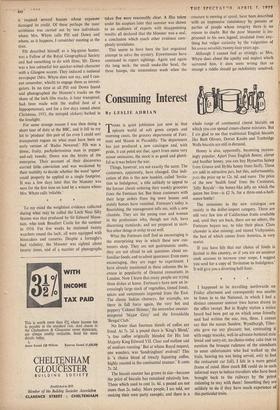Consuming Interest
By LESLIE ADRIAN ITIHERE is quiet jubilation just now in that I epicure world of soft green carpets and morning coats, the grocery department of Fort- num and Mason in Piccadilly. The department has just produced a new catalogue and, with pride, it can point out that, apart from some very minor omissions, the stock is as good and plenti- ful as it was before the war.
Things, however, are not exactly•the same. The customers, apparently, have changed. One indi- cation of this is this new booklet, called 'Invita- tion to Indulgence,' a title unlikely to appeal to the former clients ordering their weekly groceries from the Fortnum list. But those customers with their large orders from big town houses and stately homes have vanished. Fortnum's today is flourishing, the management tells me, with a new clientele. They are the young men and women in the professions who, though • not rich, have discerning standards; and are prepared to sacri- fice other things in order to eat well.
What the Fortnum staff find so encouraging is the enterprising way in which these new cus- tomers shop. They are not gastronomic snobs, they are not afraid to ask questions about un- familiar foods, and to admit ignorance. Even more encouraging, they are eager to experiment. I have already mentioned in these columns the in- crease in popularity of Oriental restaurants in London. Now I learn that many people are trying these dishes at home. Fortnum's have now an in- creasingly large stock of vegetables, tinned foods, spices and sweetmeats imported from the East.
The classic Indian chutneys, for example, are there in full force again, the very hot and peppery `Colonel Skinner,' the somewhat sweeter- tempered `Major Grey' and the formidable `Bengal Club.'
No fewer than fourteen blends of coffee are listed. At 7s. 2d. a pound there is 'King's Blend,' `a fine coffee originally blended for His late Majesty King Edward VII. Clear and mellow and of medium roasting.' But at whose Royal request, one wonders, was `Sandringham' evolved? This is `a choice blend of treacly liquoring coffee, highly roasted in the continental manner.' It costs 7s. 2d.
The biscuit counter has grown in size—because the price of biscuits has remained relatively low. Those which used to cost ls. 4d. a pound are not more than 2s. today. More people, I am told, are making their own party canapes; and there is a whole range of continental cheese biscuits on which you can spread cream-cheese mixtures. But I am glad to see that traditional English biscuits like Bath Olivers, Dorset Knobs and Tunbridge Wells biscuits are still in demand.
Honey is also, apparently, becoming increas- ingly popular. Apart from English flower, clover and heather honey, you can buy Hymettus honey from Greece and Hybla honey from Sicily. These are sold in attractive jars, but this, unfortunately, puts the price up to 12s. 6d. and more. The price of the new `health food' from the Continent, `Jelly Royale'—the honey-like jelly on which the queen bee lives—is £2 5s. for a three-and-a-half- ounce bottle !
The omissions in the new catalogue are mainly in the dollar-import category. There are still very few tins of Californian fruits available and, until they are back, there are no others, the Fortnum buyers say, to take their place. Clam chowder is also missing; and tinned Vichyssoise, the best of which comes from America, is very scarce.
If you have felt that our choice of foods is limited in this country, or if you are an amateur cook anxious to increase your scope, I suggest you send for a copy of 'Invitation to Indulgence.' It will give you a diverting half-hour.
I happened to be travelling northwards on Friday afternoon and consequently was unable to listen in to the National, in which I had a distinct consumer interest (two horses drawn in the office sweep). But in Rugby station a notice board had been put up on which some friendly soul had written the one, two, three. I cannot say that the names Sundew, Wyndburgh, Tiber- etta gave me any pleasure; but, contrasting it with soggy teacake, well-in-advance-buttered stale bread and sorry-sir, no-choice-today cake (not to mention the brusque rudeness of the attendants to some unfortunates who had walked up the train, hearing tea was being served, only to find the restaurant car full), I felt in a more genial frame of mind. How much BR could do in such informal ways to induce travellers who have been brought back to the railways by the petrol rationing to stay with them! Something they are unlikely to do if they have much experience of this particular train.












































 Previous page
Previous page